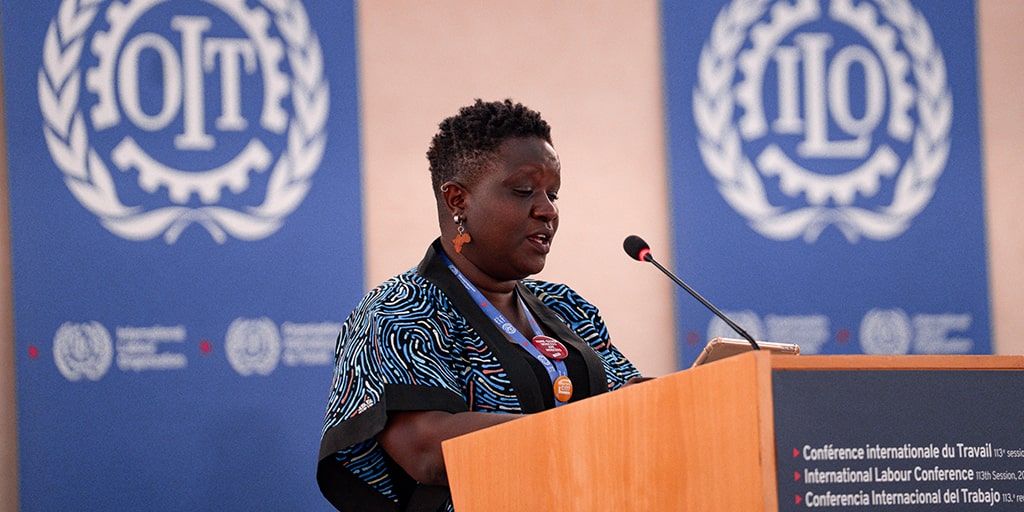Thursday, June 5th
Speaker: Jemima Nyakongo, HNI Interim Coordinator
I am Jemima Nyakongo, a basket weaver from Kenya. I stand here today not only as a home-based worker but also as the voice of millions of workers like me worldwide.
For many years, I have been an own-account worker, weaving baskets and selling them locally and nationally. I am also subcontracted by a company that orders bags from me, making me a homeworker and part of a supply chain. Despite my contributions, I am labeled as an “informal worker,” a term that overlooks the dignity and importance of my work.
I did not choose to be a home-based worker; it’s the only way to survive in my community. As a woman, I carry the burden of unpaid care work, caring for my children and household. The lack of nearby jobs makes formal employment nearly impossible—either I travel long distances daily, which I cannot do because of mobility issues and transportation costs, or I move to a larger city, which is also not feasible.
I am a worker—someone who produces, earns, and contributes to the economy. The difference between “informal” and “formal” is recognition and rights. We work long hours, earn below minimum wage, and lack access to social protections such as health insurance, maternity benefits, or pensions. Our labor is vital, yet invisible.
Today, I speak on behalf of HomeNet International, a global network representing over 1.3 million home-based workers through 71 organizations across 30 countries. The agenda for this year’s ILC is central to our advocacy. Home-based workers need to be recognized as workers, and only then will they be able to transition to formal employment. We are also key players in the platform economy and are impacted by biological hazards at home.
I will briefly outline key issues and immediate steps needed to address the latter:
First, we are grateful to be part of the discussions on ILO Recommendation 204, which aims to formalize the informal economy. However, formalization must be grounded in understanding our specific needs, such as having:
- Laws and regulations that recognize our work and protect our rights;
- Access to social protections like healthcare, maternity benefits, childcare, and pensions;
- Support for the Social and Solidarity Economy through policies and services.
Fortunately we have ILO Convention 177, adopted in 1996, which recognizes homeworkers as workers. Yet, only 13 countries have ratified it. This Convention must be prioritized globally, and national laws should align with its principles and be implemented.
Second, in the context of the platform economy, many home-based workers now operate within this changing landscape, which offers access to markets but exposes us to vulnerabilities—canceled orders, financial losses, and lack of protections. When platforms set deadlines and large orders, they act as employers but often ignore their responsibilities toward us.
Finally, climate change further threatens our livelihoods. Extreme heat, floods, and other disasters disproportionately impact us. During floods, homes and workplaces fill with contaminated water, stagnating for days, destroying our only source of income, posing severe health risks and exposing us to biological hazards that harm us and our families.
In light of these challenges, we urge the Tripartite at the ILC, governments, and employers worldwide to consider the following:
- The definition of “worker” must be broadened to include all—formal and informal, own-account workers and subcontracted homeworkers.
- “Workplace” must be defined to encompass all sites of economic activity, including homes. ILO Convention 190 recognizes workplaces beyond factories, in public and private spaces.
We invite governments, employers, and communities to join HomeNet International in building a fairer, more inclusive economy—one that leaves no one behind. Ensuring decent work for everyone is a shared responsibility.


